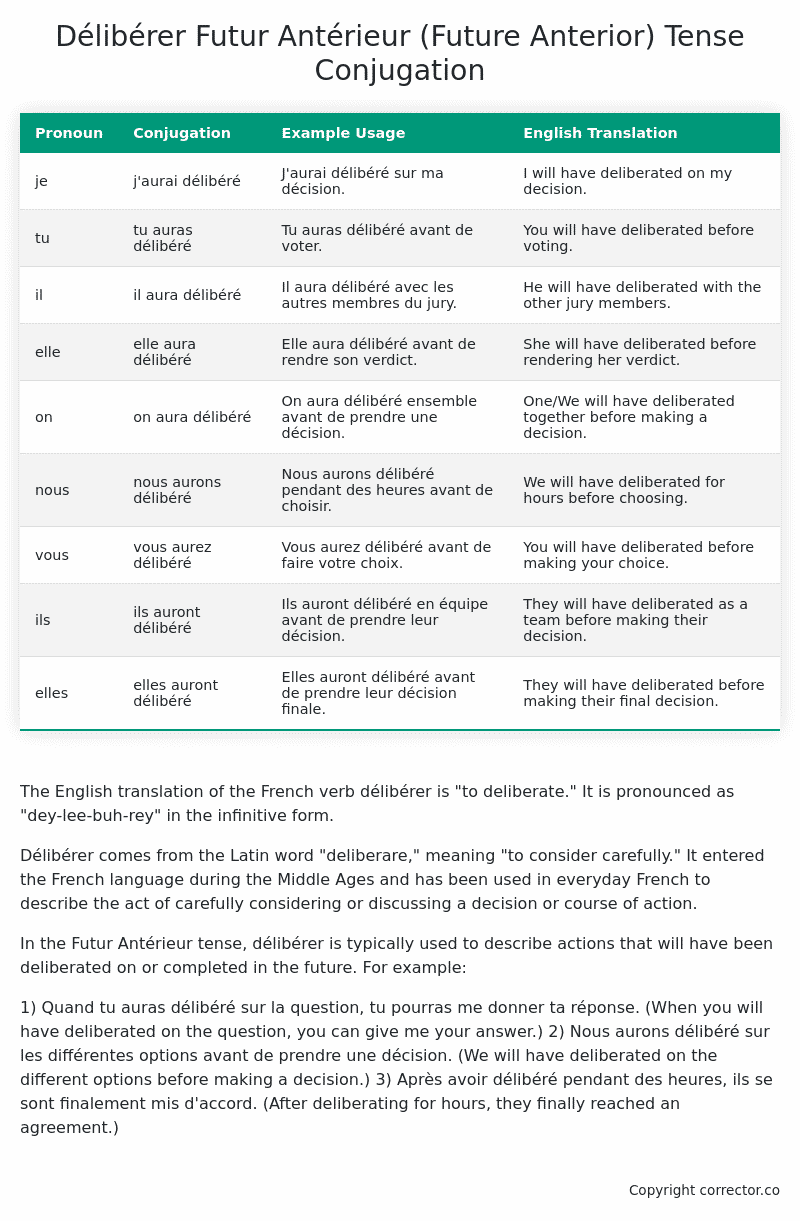Futur Antérieur (Future Anterior) Tense Conjugation of the French Verb délibérer
Introduction to the verb délibérer
The English translation of the French verb délibérer is “to deliberate.” It is pronounced as “dey-lee-buh-rey” in the infinitive form.
Délibérer comes from the Latin word “deliberare,” meaning “to consider carefully.” It entered the French language during the Middle Ages and has been used in everyday French to describe the act of carefully considering or discussing a decision or course of action.
In the Futur Antérieur tense, délibérer is typically used to describe actions that will have been deliberated on or completed in the future. For example:
1) Quand tu auras délibéré sur la question, tu pourras me donner ta réponse. (When you will have deliberated on the question, you can give me your answer.)
2) Nous aurons délibéré sur les différentes options avant de prendre une décision. (We will have deliberated on the different options before making a decision.)
3) Après avoir délibéré pendant des heures, ils se sont finalement mis d’accord. (After deliberating for hours, they finally reached an agreement.)
Table of the Futur Antérieur (Future Anterior) Tense Conjugation of délibérer
| Pronoun | Conjugation | Example Usage | English Translation |
|---|---|---|---|
| je | j’aurai délibéré | J’aurai délibéré sur ma décision. | I will have deliberated on my decision. |
| tu | tu auras délibéré | Tu auras délibéré avant de voter. | You will have deliberated before voting. |
| il | il aura délibéré | Il aura délibéré avec les autres membres du jury. | He will have deliberated with the other jury members. |
| elle | elle aura délibéré | Elle aura délibéré avant de rendre son verdict. | She will have deliberated before rendering her verdict. |
| on | on aura délibéré | On aura délibéré ensemble avant de prendre une décision. | One/We will have deliberated together before making a decision. |
| nous | nous aurons délibéré | Nous aurons délibéré pendant des heures avant de choisir. | We will have deliberated for hours before choosing. |
| vous | vous aurez délibéré | Vous aurez délibéré avant de faire votre choix. | You will have deliberated before making your choice. |
| ils | ils auront délibéré | Ils auront délibéré en équipe avant de prendre leur décision. | They will have deliberated as a team before making their decision. |
| elles | elles auront délibéré | Elles auront délibéré avant de prendre leur décision finale. | They will have deliberated before making their final decision. |
Other Conjugations for Délibérer.
Le Present (Present Tense) Conjugation of the French Verb délibérer
Imparfait (Imperfect) Tense Conjugation of the French Verb délibérer
Passé Simple (Simple Past) Tense Conjugation of the French Verb délibérer
Passé Composé (Present Perfect) Tense Conjugation of the French Verb délibérer
Futur Simple (Simple Future) Tense Conjugation of the French Verb délibérer
Futur Proche (Near Future) Tense Conjugation of the French Verb délibérer
Plus-que-parfait (Pluperfect) Tense Conjugation of the French Verb délibérer
Passé Antérieur (Past Anterior) Tense Conjugation of the French Verb délibérer
Futur Antérieur (Future Anterior) Tense Conjugation of the French Verb délibérer (this article)
Subjonctif Présent (Subjunctive Present) Tense Conjugation of the French Verb délibérer
Subjonctif Passé (Subjunctive Past) Tense Conjugation of the French Verb délibérer
Subjonctif Imparfait (Subjunctive Imperfect) Tense Conjugation of the French Verb délibérer
Subjonctif Plus-que-parfait (Subjunctive Pluperfect) Tense Conjugation of the French Verb délibérer
Conditionnel Présent (Conditional Present) Tense Conjugation of the French Verb délibérer
Conditionnel Passé (Conditional Past) Tense Conjugation of the French Verb délibérer
L’impératif Présent (Imperative Present) Tense Conjugation of the French Verb délibérer
L’infinitif Présent (Infinitive Present) Tense Conjugation of the French Verb délibérer
Struggling with French verbs or the language in general? Why not use our free French Grammar Checker – no registration required!
Get a FREE Download Study Sheet of this Conjugation 🔥
Simply right click the image below, click “save image” and get your free reference for the délibérer Futur Antérieur tense conjugation!

Délibérer – About the French Futur Antérieur (Future Anterior) Tense
Construction
Common Everyday Usage Patterns
Interactions with Other Tenses
For example
Summary
I hope you enjoyed this article on the verb délibérer. Still in a learning mood? Check out another TOTALLY random French verb conjugation!


